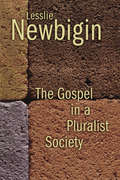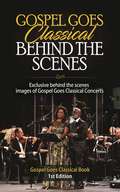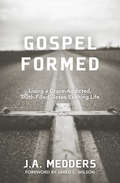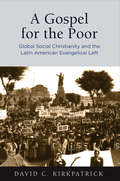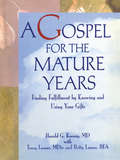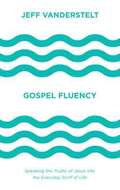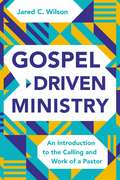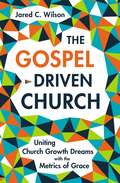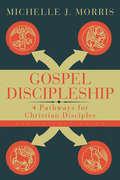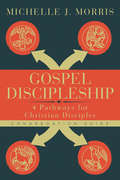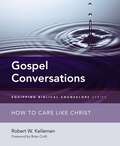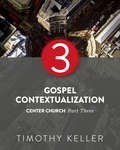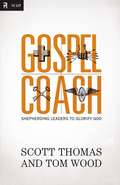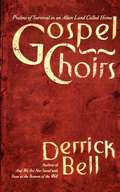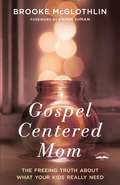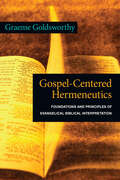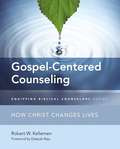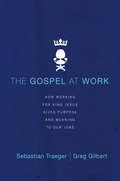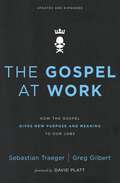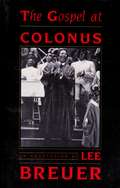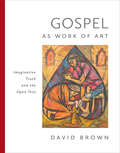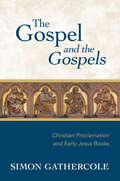- Table View
- List View
The Gospel in Brief
by Leo Tolstoy Isabel HapgoodNovelist, essayist, dramatist, and philosopher, Count Leo Tolstoy is most famous for his sprawling portraits of nineteenth-century Russian life, as recounted in Anna Karenina and War and Peace. But at the age of fifty, he endured a spiritual crisis that prompted him to seek answers from learned men on "the problem of life." When they were unable to offer solutions, he turned to the study of Christianity. Dazzled by the light of truth that illuminated mankind for more than two thousand years, he found answers to his questions that led him to write his own version of "the greatest story ever told."As he reinterpreted the first four books of the New Testament into a single, integrated version that expressed the essence of Christ, Tolstoy avoided the mystery and miracles emphasized by the Church. Instead, he worked exclusively from the actual words and actions of Jesus, uncluttered by what he regarded as the Church's false interpretations. The result: a revolutionary work that challenged long-held doctrines, presented in a way that reflects Tolstoy's views on the divine purpose for human existence in a chaotic world. As brilliantly written as his other literary treasures, The Gospel in Brief is a remarkably modern--and moving--meditation on spirituality.
The Gospel in a Pluralist Society
by Lesslie NewbiginHow does the gospel relate to a pluralist society? What is the Christian message in a society marked by religious pluralism, ethnic diversity, and cultural relativism? Should Christians encountering today's pluralist society concentrate on evangelism or on dialogue? How does the prevailing climate of opinion affect, perhaps infect, Christians' faith?These kinds of questions are addressed in this noteworthy book by Lesslie Newbigin. A highly respected Christian leader and ecumenical figure, Newbigin provides a brilliant analysis of contemporary (secular, humanist, pluralist) culture and suggests how Christians can more confidently affirm their faith in such a context.While drawing from scholars such as Michael Polanyi, Alasdair MacIntyre, Hendrikus Berkhof, Walter Wink, and Robert Wuthnow, The Gospel in a Pluralist Society is suited not only to an academic readership. This heartfelt work by a missionary pastor and preacher also offers to Christian leaders and laypeople some thoughtful, helpful, and provocative reflections.
Gospel Goes Classical Behind the Scenes: Exclusive Behind the Scenes Images of Gospel Goes Classical Concerts. (Gospel Goes Classical Book 1st Edition #1)
by Steve LaneExclusive Behind the Scenes Images of Gospel Goes Classical Concerts.
Gospel Formed: Living a Grace-Addicted, Truth-Filled, Jesus-Exalting Life
by J. A. MeddersChristianity is based on the foundation of the good news of the gospel. Yet how many Christians truly find their identity there? How many are thriving in a community clinging to the gospel? How many forget about the wondrous glory of Jesus? J. A. Medders is on a mission to help Christians remember that the power that raised Jesus from the dead is also the power for our everyday life in Christ. Yet living a gospel-centered life does not always come easily. The biblical meditations in Gospel Formed help to kindle, or rekindle, the passion to live a grace-addicted, truth-filled, Jesus-exalting life by constantly driving the reader back to the power of the cross and the empty tomb. Funny, punchy, and theologically accessible, readers will be encouraged, challenged, and ultimately reoriented to the true North of Christianity--Christ Himself.
A Gospel for the Poor: Global Social Christianity and the Latin American Evangelical Left
by David C. KirkpatrickIn 1974, the International Congress on World Evangelization met in Lausanne, Switzerland. Gathering together nearly 2,500 Protestant evangelical leaders from more than 150 countries and 135 denominations, it rivaled Vatican II in terms of its influence. But as David C. Kirkpatrick argues in A Gospel for the Poor, the Lausanne Congress was most influential because, for the first time, theologians from the Global South gained a place at the table of the world's evangelical leadership—bringing their nascent brand of social Christianity with them.Leading up to this momentous occasion, after World War II, there emerged in various parts of the world an embryonic yet discernible progressive coalition of thinkers who were embedded in global evangelical organizations and educational institutions such as the InterVarsity Christian Fellowship, the International Fellowship of Evangelical Students, and the International Fellowship of Evangelical Mission Theologians. Within these groups, Latin Americans had an especially strong voice, for they had honed their theology as a religious minority, having defined it against two perceived ideological excesses: Marxist-inflected Catholic liberation theology and the conservative political loyalties of the U.S. Religious Right.In this context, transnational conversations provoked the rise of progressive evangelical politics, the explosion of Christian mission and relief organizations, and the infusion of social justice into the very mission of evangelicals around the world and across a broad spectrum of denominations. Drawing upon bilingual interviews and archives and personal papers from three continents, Kirkpatrick adopts a transnational perspective to tell the story of how a Cold War generation of progressive Latin Americans, including seminal figures such as Ecuadorian René Padilla and Peruvian Samuel Escobar, developed, named, and exported their version of social Christianity to an evolving coalition of global evangelicals.
A Gospel for the Mature Years: Finding Fulfillment by Knowing and Using Your Gifts
by Harold G KoenigThere’s good news for middle-aged and older adults who wish to grow emotionally and spiritually and experience satisfaction and joy in their mature years regardless of circumstance, health, or age. A Gospel for the Mature Years shows you how to achieve joy and fulfillment by developing a deep, personal, intimate relationship with God, recognizing your God-given gifts, and using your abilities in service to others. Our later years are not meant to be a time for idleness and withdrawal from life. Rather, this is an exciting, meaningful, and action-packed time when we should grab hold of life and live it fully, advancing God’s kingdom in our families, communities, and nation.Meant both for individual reading and for use in churches as a workbook for small discussion groups, A Gospel for the Mature Years is arranged to facilitate use in classes running on a calendar quarter of 13 Sundays. Questions for discussion at the end of each chapter have been designed to encourage individual preparation for participation in the group. Specific topics you learn about include: emotional growth and spiritual development achievement of well-being and fulfillment achieving Christian maturity preventing depression counseling and caregiving using one’s gifts and talents overcoming barriers to loving and serving others avoiding burnout and exhaustion when loving and serving others These are increasingly difficult times, requiring that God’s people work together by utilizing their talents for the benefit of others. The authors make clear that the call to service does not end with retirement. We can use this inspirational book to identify our gifts and learn how to best use them in service to God and others. A Gospel for the Mature Years will help us produce a society of people with vision--a vision of hope that life can have meaning and purpose regardless of circumstance, and of faith that every person has been given a gift that will enable them to make a difference in this world and make it a better place for their children and grandchildren.
The Gospel for Muslims: An Encouragement to Share Christ with Confidence
by Thabiti AnyabwileHow to meet a critical need: sharing the gospel with MuslimsThere are over three million Muslims living in the United States today. Soon, if not already, you will have Muslim neighbors and coworkers. Does the thought of reaching out to them with the gospel make you nervous? How can you effectively communicate the good news with such large theological differences? The Gospel for Muslims can help make sharing your faith easier than you think.Thabiti Anyabwile, who is himself a convert from Islam to Christianity, instructs you in ways to discuss the good news of Christ with your neighbors and friends. The Gospel for Muslims allows you to focus on the people rather than the religious system. Meant for the average Christian, it is not an exhaustive apologetic or comparative study of Christianity and Islam. Rather, it compellingly stirs confidence in the gospel, equipping you with the basics necessary to communicate clearly, boldly, and winsomely.
The Gospel for Muslims: An Encouragement to Share Christ with Confidence
by Thabiti AnyabwileHow to meet a critical need: sharing the gospel with MuslimsThere are over three million Muslims living in the United States today. Soon, if not already, you will have Muslim neighbors and coworkers. Does the thought of reaching out to them with the gospel make you nervous? How can you effectively communicate the good news with such large theological differences? The Gospel for Muslims can help make sharing your faith easier than you think.Thabiti Anyabwile, who is himself a convert from Islam to Christianity, instructs you in ways to discuss the good news of Christ with your neighbors and friends. The Gospel for Muslims allows you to focus on the people rather than the religious system. Meant for the average Christian, it is not an exhaustive apologetic or comparative study of Christianity and Islam. Rather, it compellingly stirs confidence in the gospel, equipping you with the basics necessary to communicate clearly, boldly, and winsomely.
Gospel Fluency: Speaking the Truths of Jesus into the Everyday Stuff of Life
by Jeff Vanderstelt Jackie Hill Perryflu-en-cy / noun : the ability to speak a language easily and effectively Even if they want to, many Christians find it hard to talk to others about Jesus. Is it possible this difficulty is because we're trying to speak a language we haven't actually spent time practicing? To become fluent in a new language, you must immerse yourself in it until you actually start to think about life through it. Becoming fluent in the gospel happens the same way--after believing it, we have to intentionally rehearse it (to ourselves and to others) and immerse ourselves in its truths. Only then will we start to see how everything in our lives, from the mundane to the magnificent, is transformed by the hope of the gospel.
Gospel-Driven Ministry: An Introduction to the Calling and Work of a Pastor
by Jared C. WilsonFrom the beginning of his ministry, Jesus called and equipped individuals who would serve his community of followers. These "shepherds" are called to preach, pray, and care for the needs of God's people. But what does it mean to be a pastor? And what is the nature of this ministry, according to the Bible?In Gospel-Driven Ministry, Jared Wilson begins by looking at the qualifications for the pastorate, addressing the notion of a call to ministry and how an individual--and a church community--can best identify the marks of maturity and affirm a call. In each chapter, Wilson looks at one of the core practices of pastoral ministry, including:Preaching SermonsDeveloping a Vibrant Prayer LifeCaring and CounselingPastoring Married and SingleGospel-Centered LeadershipFighting Sin and Spiritual WarfareResolving ConflictPassing on the Ministry to OthersIn addition, Wilson provides practical resources including theological insights on baptism and the Lord's Supper, guidance for wedding and funeral sermons, outlines for leading elder and deacon meetings, tips for interviewing new pastors, questions to ask at ordination, and advice on knowing when and how to leave a pastor role. This is a comprehensive, practical guide to pastoral ministry that prepares new pastors and equips those currently serving for long-term, healthy ministry.
The Gospel-Driven Church: Uniting Church Growth Dreams with the Metrics of Grace
by Jared C. WilsonMany evangelical churches face the problem of the open "back door"--even as new people arrive, older members are leaving, looking for something else. Combined with this problem is the discipleship deficit, the difficult truth that most evangelicals are not reaching the unchurched at the rates they think they are. In fact, many of the metrics that we often "count" in the church to highlight success really don't tell us the full story of a church's spiritual state. Things like attendance, decisions, dollars, and experiences can tell us something about a church, but not everything.To cultivate a spiritually healthy church we need a shift in our metrics--a "grace-shift" that prioritizes the work of God in the lives of people over numbers and dollars. Are people growing in their esteem for Jesus? Is there a dogged devotion to the Bible as the ultimate authority for life? Is there a growing interest in theology and doctrine? A discernible spirit of repentance? And perhaps most importantly, is there evident love for God and for our neighbors in the congregation?Leading a church culture to shift from numerical success to the metrics of grace can be costly, but leaders who have conviction, courage, and commitment can lead while avoiding some of the landmines that often destroy churches. Wilson includes diagnostic questions that will help leaders measure--and lead team transparency in measuring as a group--the relative spiritual health of their church, as well as a practical prescriptive plan for implementing this metric-measuring strategy without becoming legalistic.Most attractional church models can lean heavily on making changes to the weekend worship gatherings. And while some of these changes can be good, thriving grace-focused churches are driven by a commitment to the gospel, allowing the gospel to inform and shape the worship service and the various ministries of the church.
Gospel Discipleship Participant Guide: 4 Pathways for Christian Disciples
by Michelle J. MorrisThere was a time when discipleship was taken for granted. It was assumed that people could be persuaded to believe and that each person would step into the path that took them to Jesus. That assumption is no longer valid. As early as the Gospels, Jesus and his biographers recognize that each person brings experience to the journey, which travels through different times and places. The discipleship path for each individual disciple is assessed and determined through this Gospel Discipleship Participant Guide while the Gospel Discipleship Congregation Guide serves as the implementation guide for church leaders. It also assesses the discipleship path for the congregation as a whole. By understanding what type of disciple you are, participants in Gospel Discipleship can clarify the path they need to walk. Some people love to go on mission trips; some people really thrive learning from a great teacher; some people connect to God through painting and music; and some people just want to have a cup of coffee and talk about life and eventually get around to talking about Jesus. Participants in Gospel Discipleship can be set free from the guilt of not feeling like a "real" disciple because they don't feel called to experience the journey the same way as everyone else. Instead, participants can become the disciple Jesus wants them to be. They can spend their valuable time and energy living and walking on the path where Jesus is calling them to follow.
Gospel Discipleship Congregation Guide: 4 Pathways for Christian Disciples
by Michelle J. MorrisEach congregation has a unique mission field. Several tools for developing disciples and for engaging in discipleship are available to churches; however, the resources assume that the churches using them are similar to the church that created them. With Gospel Discipleship, individuals and churches learn how to engage in self-reflection, which then defines a path that fits their context. The discipleship path for each individual disciple is assessed and determined through the Gospel Discipleship Participant Guide while this Gospel Discipleship Congregation Guide guides the implemntation of the program and assesses the discipleship path for the congregation as a whole. Therefore, the program leader(s) needs the congregation guide while individual particpants need their own participant guide. With Gospel Discipleship, churches can identify a pathway for discipleship applied from one of the four Gospel storytellers: Matthew, Mark, Luke and John. Each had a distinct approach to discipleship which can be applied to a given church's identity, vision, and mission. As disciples are encouraged by the church to step beyond the door and engage the needs of people, they can be sent forth confidently with an awareness of personal, unique gifts, and insights into the actual mission field where they participate with God in changing the world.
Gospel Conversations: How to Care Like Christ (Equipping Biblical Counselors)
by Brian Croft Robert W. KellemenHow does a person learn to counsel others with the truth of God’s Word? Bob Kellemen believes that the best way to learn counseling is by doing it—by giving and receiving biblical counseling in the context of real, raw Christian community. Gospel Conversations explores the four compass-points of biblical counseling: Sustaining: “It’s Normal to Hurt.” Healing: “It’s Possible to Hope.” Reconciling: “It’s Horrible to Sin, but Wonderful to Be Forgiven.” Guiding: “It’s Supernatural to Mature.” These four compass points combine to equip readers to develop twenty-two ministry relational competencies—the “how to” of caring like Christ. This book serves as a practical training manual that can be used for lab and small group interaction. Gospel Conversations is the second volume in The Equipping Biblical Counselors Series, a comprehensive relational training curriculum for the local church that provides a model for equipping God’s people to change lives with Christ’s changeless truth. This two-volume series weaves together comprehensive biblical insight with compassionate Christian engagement.
Gospel Contextualization: Part Three
by Timothy KellerToday many pastors are struggling to adapt to a post-Christian culture without abandoning orthodox theology. How do we communicate the concepts of grace and substitutionary atonement in our globalized culture and context? In Center Church, Timothy Keller offers challenging insights and provocative questions based on over twenty years of ministry in New York City. This book outlines a theological vision for ministry - applying classic doctrines to our time and place - organized around three core commitments: • Gospel-centered: The gospel of grace in Jesus Christ changes everything, from our hearts to our community to the world. It completely reshapes the content, tone and strategy of all that we do. • City-centered: With a positive approach toward our culture, we learn to affirm that cities are wonderful, strategic and underserved places for gospel ministry. • Movement-centered: Instead of building our own tribe, we seek the prosperity and peace of our community as we are led by the Holy Spirit. "In this important book, Tim Keller unpacks the gospel and gently but firmly reminds us that it is nonnegotiable. At the same time, he enables us to think through how we can responsibly interact with the culture, how we can - indeed, must - appreciate good things within it, and how we can firmly and faithfully apply the gospel to it." - D.A. Carson, research professor of New Testament, Trinity Evangelical Divinity School
Gospel Coach: Shepherding Leaders to Glorify God
by Tom Wood Dr Steve Brown Scott ThomasIn order to help pastors and other Christian leaders to lovingly lead God’s flock to Jesus Christ and into God’s mission, Scott Thomas and Tom Wood clarify a process of coaching and shepherding that is rooted in the patterns of the Good Shepherd himself, a process in which leaders stir up the gifts, passion, and calling upon others’ lives. This book addresses the needs of the leader, his or her sinful tendencies, and church leadership issues. It directs the leader to the person and work of Jesus. It provides a system to intentionally shepherd leaders to glorify God in their personal, spiritual, and missional lives. Many ministry leaders serving in churches find themselves overwhelmed, disillusioned, and depressed by the enormous and challenging task of leading and ministering in a congregation. As a result, the ministry suffers, the leaders suffer, and the result is often an unhealthy church existent with little or no Gospel influence. These leaders need someone to shepherd their soul so that they can lead others to the Chief Shepherd, Jesus Christ. We suggest that coaching for the church leader looks less like corporate consulting or humanistic psychology and more like biblical-shepherding. We suggest that every church leader needs a Gospel Coach to come alongside with words of truth, wisdom and experience to encourage, admonish, comfort and help—words drawn from Scripture and godly wisdom, grounded in the gracious saving work of Jesus Christ, and presented in the context of a trusting relationship. Gospel Coaching is an intentional relationship to skillfully care for others with four ancient shepherding principles: 1) Know the sheep, 2) Feed the sheep, 3) Lead the sheep, and 4) Protect the sheep. A Gospel Coach both inquires about the personal, spiritual, and missional aspects of a ministry leader’s life in a loving yet focused manner, and also probes the church leader for compulsive unbelief or selfish motivation, or disobedience and sin, and leads the ministry leader back to the Gospel, through belief, repentance and obedience. Churches that desire to be rich in a Gospel application toward their city, their relationships with one another, their communication and worship, as well as their service, will benefit to a greater degree by having their leaders being coached by a Gospel-centered leader.
Gospel Choirs
by Derrick A. BellJust like the songs of a gospel choir, the pieces in this book give voice to the hardships faced by African Americans. Through allegorical stories and fictional encounters, dreams and dialogues, it presents fresh perspectives on the different issues that concern blacks. Despite their tough subjects, however, these stories resound with laughter and compassion and a continuing theme of Christian love.
Gospel-Centered Mom: The Freeing Truth About What Your Kids Really Need
by Karen Ehman Brooke McglothlinIt’s Time to Stop Trying to Be the Perfect MomYou long to be the mom your kids need, but often you’re convinced you come up short. The label “not enough” seems to be stamped across everything you do—and yet parenting is the one thing you want most to get right. What if the solution is simply to embrace the truth that you are not enough—but God is? In Gospel-Centered Mom Brooke McGlothlin reveals how our entire approach to motherhood shifts when we stop chasing our vision of a perfect family and start full-out pursuing God. With refreshing candor, Brooke examines the daunting task of raising children in the light of God’s Word and challenges you to: · embrace your moment-by-moment need for Jesus · release the stress of believing everything is your responsibility · learn to fight for rather than against your child · believe that the story God is writing with your life is worth the sacrifice · practice the daily disciplines that lead to Gospel-centered parentingAs you learn to anchor your life in the Gospel, you’ll find increased freedom, purpose, and joy in motherhood. And you’ll discover that Jesus is more than capable of meeting every need, for your children and for you.
Gospel-Centered Hermeneutics: Foundations and Principles of Evangelical Biblical Interpretation
by Graeme GoldsworthyWhile there are many books on hermeneutics, Graeme Goldsworthy's perception is that evangelical contributions often do not give sufficient attention to the vital relationship between hermeneutics and theology, both systematic and biblical. In this new paperback edition of Gospel-Centered Hermeneutics, Goldsworthy moves beyond a reiteration of the usual arguments to concentrate on the theological questions of presuppositions, and the implications of the Christian gospel for hermeneutics. In doing so, he brings fresh perspectives on some well-worn pathways. Part I examines the foundations and presuppositions of evangelical belief, particularly with regard to biblical interpretation. Part II offers a selective overview of important hermeneutical developments from the sub-apostolic age to the present, as a means of identifying some significant influences that have been alien to the gospel. Part III evaluates ways and means of reconstructing truly gospel-centered hermeneutics. Goldsworthy's aim throughout is to commend the much-neglected role of biblical theology in hermeneutical practice, with pastoral concern for the people of God as they read, interpret and seek to live by his written Word.
Gospel-Centered Counseling: How Christ Changes Lives
by Deepak Reju Robert W. KellemenEveryone talks about the personal ministry of the Word, but how do we make one-another ministry truly biblical? Gospel-Centered Counseling equips readers to change lives with Christ’s changeless truth. It does so by examining life’s seven ultimate questions and then guiding readers on a journey that explores the biblical, gospel-centered narrative of: The Word: “What is truth?” “Where can I find answers?” The Trinity: “Who is God?” “Can I know Him personally?” Creation: “Who am I?” “What makes people tick?” Fall: “What went wrong?” “Why do we do the things we do?” Redemption: “Can I change?” “How do people change?” Glorification: “Where am I headed?” “How does our future destiny impact our present reality?” Sanctification: “How can I help?” “How can I change lives?" Bob Kellemen builds on the foundation of the written Word and provides a gospel-centered resource for understanding people, diagnosing problems, and prescribing biblically-based solutions. Gospel-Centered Counseling is the first volume in The Equipping Christian Counselors Series, a comprehensive relational training curriculum for the local church that provides a model for equipping God’s people to change lives with Christ’s changeless truth. This two-volume series weaves together comprehensive biblical insight with compassionate Christian engagement.
The Gospel at Work: How Working for King Jesus Gives Purpose and Meaning to Our Jobs
by Greg D. Gilbert Sebastian TraegerFind God’s vision for your job. Reclaim God’s vision for your life. Many Christians fall victim to one of two main problems when it comes to work: either they are idle in their work, or they have made an idol of it. Both of these mindsets are deadly misunderstandings of how God intends for us to think about our employment. In The Gospel at Work, Sebastian Traeger and Greg Gilbert unpack the powerful ways in which the gospel can transform how we do what we do, releasing us from the cultural pressures of both an all-consuming devotion and a punch-in, punch-out mentality—in order to find the freedom of a work ethic rooted in serving Christ. You’ll find answers to some of the tough questions that Christians in the workplace often ask: What factors should matter most in choosing a job? What gospel principles should shape my thinking about how to treat my boss, my co-workers, and my employees? Is full-time Christian work more valuable than my job? Is it okay to be motivated by money? How do you prioritize—or balance—work, family and church responsibilities? Solidly grounded in the gospel, The Gospel at Work confronts both our idleness at work and our idolatry of work with a challenge of its own—to remember that whom we work for is infinitely more important than what we do.
The Gospel at Work: How the Gospel Gives New Purpose and Meaning to Our Jobs
by David Platt Greg D. Gilbert Sebastian TraegerReclaim God's vision for your life.Many Christians fall victim to one of two main problems when it comes to work: either they are idle in their work, or they have made an idol of it. Both of these mindsets are deadly misunderstandings of how God intends for us to think about our employment.In The Gospel at Work, Sebastian Traeger and Greg Gilbert unpack the powerful ways in which the gospel can transform how we do what we do, releasing us from the cultural pressures of both an all-consuming devotion and a punch-in, punch-out mentality - in order to find the freedom of a work ethic rooted in serving Christ.You'll find answers to some of the tough questions that Christians in the workplace often ask:What factors should matter most in choosing a job?What gospel principles should shape my thinking about how to treat my boss, my co-workers, and my employees?Is full-time Christian work more valuable than my job?Is it okay to be motivated by money?How do you prioritize - or balance - work, family and church responsibilities?Solidly grounded in the gospel, The Gospel at Work confronts both our idleness at work and our idolatry of work with a challenge of its own - to remember that whom we work for is infinitely more important than what we do.
The Gospel at Colonus
by Lee BreuerA founding member of the acclaimed New York-based company Mabou Mines, Breuer's gifts as a writer and director have have made him a mainstay of the theatrical avant-garde.
Gospel as Work of Art: Imaginative Truth and the Open Text
by David BrownA lushly illustrated, magisterial exploration of the imaginative truth of the gospel In the modern academy, truth and imagination are thought to be mutually exclusive. But what if truth can spring from other fonts, like art, literature, and invention? The legacy of the Enlightenment favors historical and empirical inquiry above all other methods for searching for truth. But this assumption stymies our theological explorations. Though the historicity of Jesus&’s life, death, and resurrection is important, it is not of sole importance. For instance, is John&’s Gospel any less &“true&” than the Synoptics just because it&’s less historically accurate? David Brown challenges us to expand our understanding of the gospel past source criticism and historical Jesus studies to include works of imagination. Reading Scripture in tandem with works of art throughout the centuries, Brown reenvisions the gospel as an open text. Scholars of theology and biblical studies, freed from literalism, will find new avenues of revelation in Gospel as Work of Art. This volume includes over one hundred color illustrations.
The Gospel and the Gospels: Christian Proclamation and Early Jesus Books (Baylor-mohr Siebeck Studies In Early Christianity Ser.)
by Simon J. GathercoleA robust scholarly defense of the distinctiveness of the canonical Gospels. Is there anything that makes the four New Testament Gospels different from other early Christian Gospels? The tendency among biblical scholars of late has been to declare the answer to this question no—that the Gospels of Matthew, Mark, Luke, and John were grouped together by happenstance and are defended as canonical today despite there being no essential commonalities between them. Simon Gathercole challenges this prevailing view and argues that there are in fact substantial differences of theological content between the New Testament Gospels and noncanonical Gospels. Gathercole shows how the Gospels of Matthew, Mark, Luke, and John each include four key points that also formed the core of early Christian preaching and teaching: Jesus&’s identity as messiah, the saving death of Jesus, the resurrection of Jesus, and Scripture&’s foretelling of the Christ event. In contrast, most noncanonical Gospels—like the Gospel of Thomas, the Gospel of Truth, and Marcion&’s Gospel—only selectively appropriated these central concerns of early Christian proclamation.

